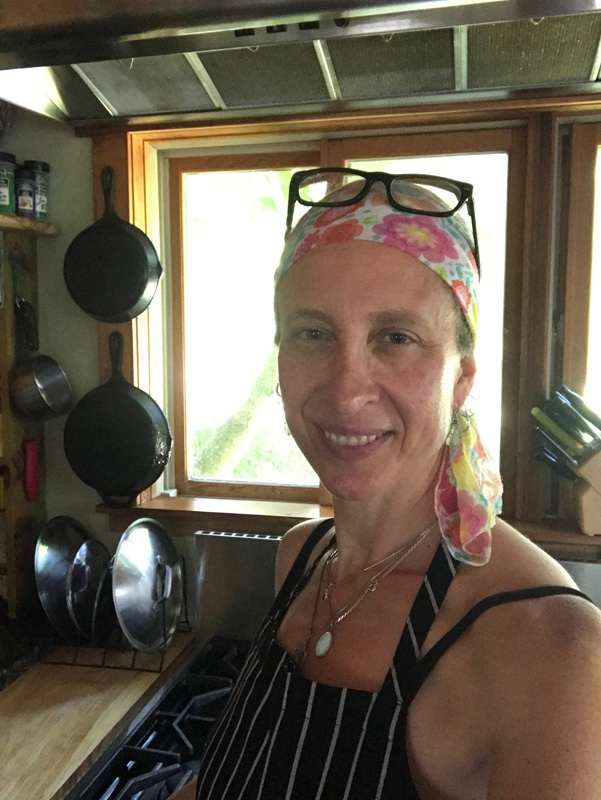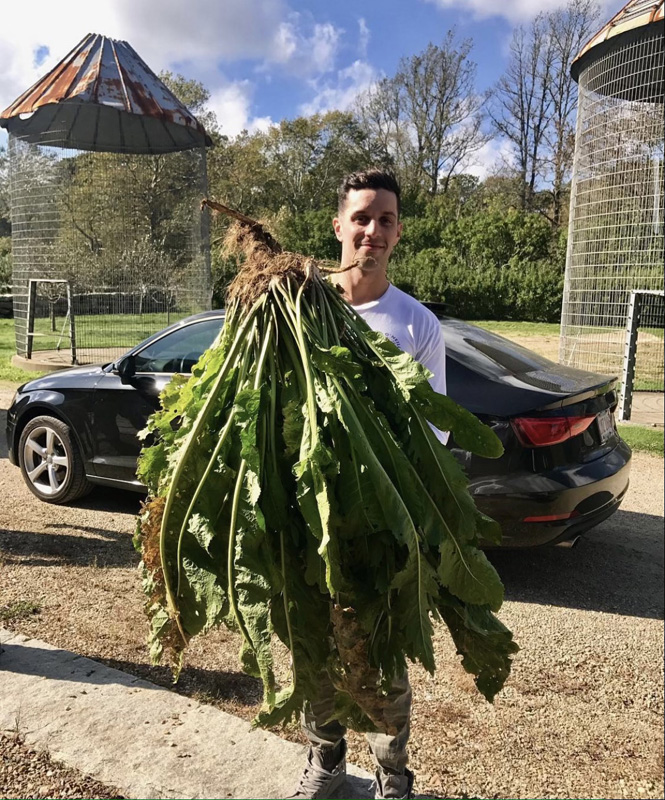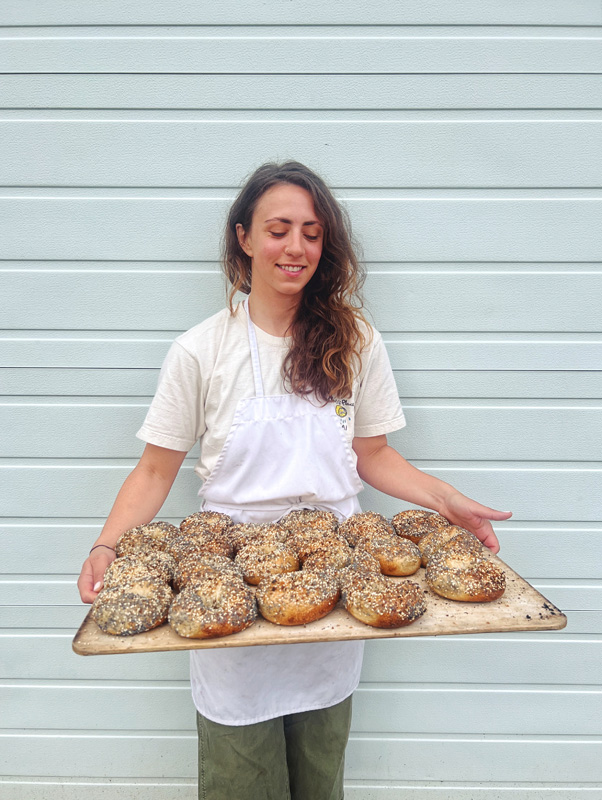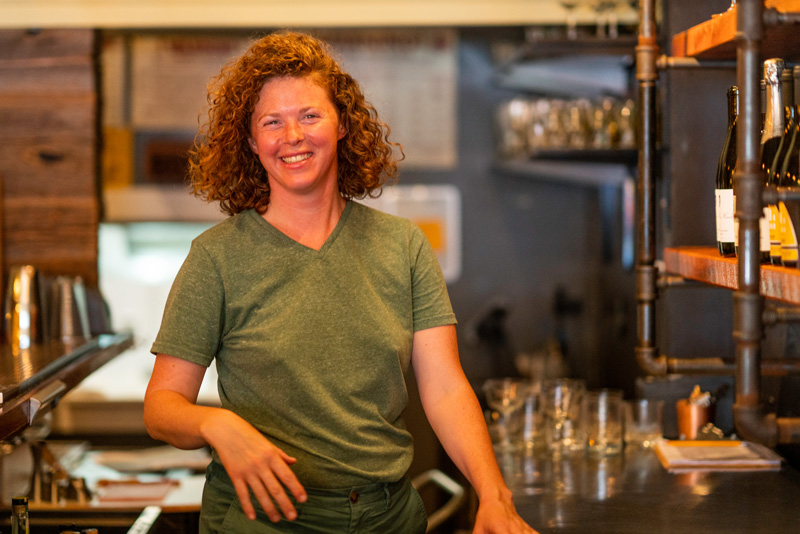When I was a child, my ’70s Martha’s Vineyard food experience was essentially grilled Cracker Barrel Cheddar cheese sandwiches on Pepperidge Farm wheat bread, clingy clam chowder from any of the Island food shops, an occasional muffin from the Black Dog, and a boiled lobster at the Home Port for an adult’s birthday. I think we went to Le Grenier and the Kelley House for a meal once or twice, and maybe Helios too. Then restaurants began popping up. The Oyster Bar, Feasts, and the Roadhouse come to mind. With them came a new kind of food culture, where Island-grown food and seafood began to be embraced and celebrated. Of course, this has since exploded. And in the past decade, it has been a boon for local food producers. The rise, and in some cases resurgence, of excellent farms such as Mermaid, Grey Barn, North Tabor, the Allen Farm, Blackwater Farm, Slough Farm, Morning Glory, and Beetlebung, along with oyster and kelp farming, and thoughtful propagation of scallops and clams, has attracted young, talented chefs and entrepreneurs.
But early this year, Edible began to hear whispers that a wave of chefs and food producers were leaving. Jefferson Munroe and his incredible fried chicken, and the GOOD Farm, gone. Nate Gould, who championed local fare for the Harbor View Hotel and Beach Plum Inn — including doing things like buying 120,000 oysters a year from Nick Turner for the Harbor View — gone. Danielle Pattavina and their beloved Seaweed’s, gone. Georgia Macon and her exceptional pastries, gone.
What? No!
We at Edible wanted to find out why. So we reached out to talk to these folks, and rather than talking about what they were dishing up food-wise, found ourselves having deep conversations about housing. Yes, you heard us right. Housing. Because a lack of housing and the ability to live and work in a sane way in a community that supports healthy food practices has become a near impossibility for many of the most talented food people we know.

First, we checked in with Laura Silber, one of the key people behind the proposed housing bank, which Edible feels is a good place to start. She is also an incredibly talented and seasoned chef. She explained the situation this way: “Any locavore food scene is an ecosystem. The Vineyard is no different. There are the growers, producers, foragers, people fishing, the people who transport the food around the Island, the private chefs, restaurants, and customers. When you lose any piece of this vibrant ecosystem, it falls apart. It’s a network. And it can and will collapse, and we will lose our culinary identity if we do not support a robust array of talents.” Of losing Jefferson Munroe, she says, “It is nothing short of a tragedy for me. He is a friend, but in the past 10 years what he made through the Larder shaped my cooking. The locally raised poultry and meat, the pickled and fermented things. His schmaltz was the magic ingredient in my food. I don’t have the time to make my own 12 quarts of bone broth a week. And his chicken on Friday nights was this amazing, romantic experience. Being able to buy such beautiful food made by someone I know, appreciate, and respect. Ugh. Losing him. It sucks.”
Unfortunately, due in some part to COVID, and in other parts to poor infrastructure for Island businesses (talk to chefs about access to water, or how to deal with waste, in Vineyard Haven or Chilmark), we are now seeing an ebb tide in the food waters. As most know, COVID brought the most unanticipated and tremendous boon to the real estate market, which while good for those selling real estate makes for an incredibly difficult reality for those with businesses — particularly food businesses that need housing for their large staffs for the summer months. The cheap rentals that were once available have sold for hundreds of thousands of dollars, if not millions.

One restaurant owner who wishes to remain anonymous shared that they spend $50,000 on housing for their three-month season. When we talked to Nate Gould (formerly of the Beach Plum Inn and Harbor View Hotel) about this, he said, “Yeah. I mean, nowhere else in the country are restaurants [not hotel restaurants] providing or finding housing for their employees. There are some folks I know who have three or four properties, and either give it to their staff as an incentive to come, or allocate a percentage of each staff person’s salary toward rent for these properties.” He laughs, “I mean, in a normal climate a restaurant’s profit margins are not great, but on the Island it’s terrible.” Nate puts it in the worker context as well: “I mean, you pay a dishwasher 18 or 19 bucks an hour, which is high to begin with, but then it’s not high enough for that person to afford to rent something during the summer months, so you end up hiring a kid who has a connection — an aunt, grandparents, friends of friends who have a house — and they stay until they have to go back to school in the middle of August.”
“I lived with two employees last year out of necessity, which, I can tell you, is not a recipe for a sustainable work-life balance,” Elana Carlson of Fantzye Bagels told us.
“When I first moved to the Island 11 years ago, I was so excited. I mean, the shellfish, fishermen, wild food, dairy farms, and farms. It was just amazing to be in a community that cared this much about food, and where the food was from. Everything seemed possible,” Nate remembers.
Elana had a similar experience. Her friend Kathryn Arffa connected her with Beetlebung Farm and the Beach Plum Inn, when Chris Fischer was at the helm. She was delighted to be working with — and in such close proximity to — so many talented chefs and producers. Olivia Pattison of Seaweed’s and Cinnamon Starship bread was working there. And so was Danielle Pattavina of Seaweed’s. ”There was also a romance to the sourcing. Buying fish from the docks in Menemsha,” Elana laughs.

But let’s get back to Jefferson Munroe for a moment. We, along with so many others, thought if anyone had a shot at successfully growing (and selling) their own food on the Island, it would be him. “I can’t believe the Island lost Jefferson,” Nate says. “I mean, his chickens and turkeys were beautiful.” We agree. But, as Jefferson told us, “It was time.” For the past 10 years, Jefferson has lived in and leased the old Craig Kingsbury property, across from the Scottish Bakehouse, from Kristen Henshaw and raised poultry as the GOOD Farm. He also co-owned the Larder with the Scottish Bakehouse’s Danielle Dominick. “But I needed a lot of help, and I couldn’t afford to pay them without my food prices becoming astronomical, like 20 percent more than I was already charging. And there was an instability of leasing rather than owning that just became untenable. And there was no way I could afford to buy enough land to farm on Martha’s Vineyard. Plus, I was working every day from April to October. I don’t want to live like that.” So Jefferson and his wife Erin bought a farm in Columbia, Conn., and moved this spring: “I never thought I’d be here. Back in my home state. But it works for us.” Erin is in nurse practitioner school, and Columbia is close to Willamantic and Hartford, where she can find work.
Ironically, Nate Gould and his wife just bought a house in nearby Killingly, Conn. Nate says, “It’s about an hour from Boston, which is great.” He is now back at Boston’s O Ya, a famed contemporary Japanese-inspired restaurant, a few days and nights a week, “doing R&D.” But, Nate confesses, “I still want to return to the Vineyard. If the right opportunity presented itself, I would do everything to make it work.”

Elana Carlson is doing everything she can to make it work here for Fantzye Bagels. Elana has worked at the Beach Plum Inn, with Meave McCauliffe and with Molly Levine at Behind the Bookstore, and with Olivia Pattison and Danielle Pattavina at Seaweed’s, and then she had the thought, “I am a Jewish girl. I can make bagels.” Thus Fantzye Bagels was born. But she says, “I wonder how and if I’ll be able to continue to keep doing it here.” The kitchen she uses is being sold. She rents, and has three roommates in the summer. “When I think about having a brick-and-mortar shop, I do the math, and it really is a question of how many bagels I can possibly bake and sell, and who would support this to make it possible to afford to run a year-round business. I don’t see a way to do that. I could see us burning out. The product wouldn’t be as inspired. So many of my friends are in the process of leaving.”
Danielle Pattavina says, “I am so happy to be talking about housing!” Last summer, they had people applying from all over, reaching out to work at Seaweed’s. But finding housing for them was nothing short of a nightmare. “I had one person say, ‘I have a camper.’ But then it was like, ‘You can only park at the campground for one week.’ Then I found one room of housing in Menemsha — two twin beds — and that was the only thing I could offer my chef.”
We mention the $50,000 price tag for rent for summer employees and Danielle says, “I would have spent money, but I just could not find anything. I was looking on Facebook, Craigslist, calling friends of friends, and when I finally got a lead, I was the 40th person to call.”
For Danielle, the other challenge was sourcing local food, which was at the heart of Seaweed’s menu. “Since COVID, I was competing with private chefs who could pay retail for everything, and had unlimited budgets. It was not the Vineyard I’ve known.”
Nate agrees, “The number of private chefs on the Island is crazy now. People took their annual restaurant budgets and put that money toward a cook to work for them. But half of them have little or no food experience. I cannot believe what they are charging and serving, and it is affecting the restaurants.”
When asked what would help them come back to the Island, all the chefs concur: affordable housing and a community that supports at least a nine-month food season.

“If I had a bazillion dollars, I’d come back,” Danielle laughs. “But I do not want to go the investor model route. The Seaweed’s motto was ‘No assholes, no bigots.’ And I meant it. I wanted it to be a safe space, and I didn’t want to risk having to bend for an investor’s friend’s attitude.” They pause, “I could cry talking about this. I mean, the thing is that I am so proud of what we created. It was a safe space. I can’t tell you how many queer folks came and said, ‘This is the first time we’ve had a queer community space here on the Island.’ Or a queer teenager coming and celebrating their birthday with us. It was amazing.”
“But it’s not just staff housing,” they add, “it’s all of it. Because it is not sustainable to have a year-round place here; you have to shut down and then open back up. The water has to be turned on, and then the pipes must be blown. And this also means you have to basically hire an entirely new staff every year, which means it’s like opening a new restaurant every year. And just when you are finally finding a rhythm, people are trained, people have found your food and like it and are beginning to return for a second or third meal, you have to shut down. The end of the summer feels heartbreaking, like the last day at a great sleepaway camp. You don’t want to say goodbye.”
But Danielle and their partner have decided to say goodbye to the Vineyard. They moved to Cambridge, and this summer will be opening Momma’s, which will sell natural wine and regionally grown produce. For those in Boston, you will be able to find Momma’s on Mass Ave., between Porter and Davis Squares.
So what can we do to foster a dynamic food system? Vote for food by voting for affordable housing. Vote for laws and bylaws that will support farmers and chefs. Create laws and bylaws that incentivize landowners and restaurants to remain open for more than two or four months so that we have a year-round food community. Invest in our farmers and food producers. Invest in affordable housing. Eat out.
In Nina Burleigh’s recent New York Times article on the exclusive Caribbean island of St. Barth’s, which is struggling with all the same issues our Island faces, she asked, “If arguably some of the world’s wealthiest and most sophisticated people can’t or won’t protect the air, water, coral reefs, and sea turtles around their own playground, how can anyone reasonably expect humanity to protect the planet?”
We talk about the same thing here on Martha’s Vineyard — conservation of land and animals. But what about conservation of people and community? So we would expand on Burleigh’s idea, adding, “If arguably some of the world’s wealthiest and most sophisticated people can’t or won’t protect and ensure housing for the very people growing and serving them food, how can anyone reasonably expect that humanity will look out for others as a whole?” When will we start taking care of those who help us? This includes those who grow our food and cook, but also the doctors, nurses, shopkeepers, farmers, builders, town administrators, and schoolteachers. These are the people who define us, and it is time to make an affordable space for them so that we don’t lose our community. Because isn’t it as much the food and the community as the land that draws us here?

